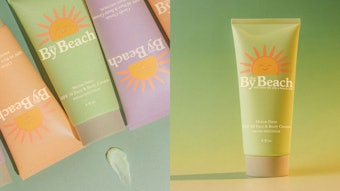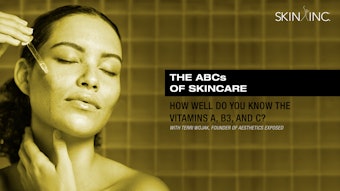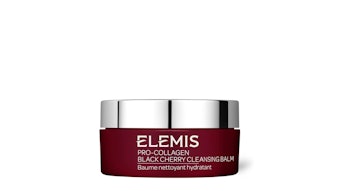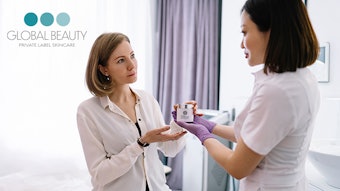
As the beauty industry has grown, clients' confusion has increased. According to vitabotanics, 69% of consumers have purchased a product without understanding the label.1 Furthermore, social media usage has only increased and consumers are using TikTok as their new search engine, which is spreading misinformation. This is where the industry professionals come in.
Skin Care Education
As a third-generation esthetician, whose grandmother founded the first fully-accredited esthetics institute in the U.S., I saw a white space in the skin care industry. I myself struggled to find confidence in myself and my skin. This was mainly due to the fact that I hadn’t found an effective, accessible and trustworthy source for facial treatments administered by expertly trained estheticians. Once I recognized my own potential as an expert and leader in the space, I saw there was a ripe opportunity to boost others' confidence by making consistent skin care attainable. Consumer anxiety, overwhelming treatment menus, and expensive add-ons was the norm, but transparency and honesty was what was missing to help build confidence within the beauty industry.
As a licensed professional or service provider, you are the solution to this confusion. For example, estheticians have on average 600 hours of formal training, and combined with providing skin care treatments all day there is no one better to provide treatment recommendations to clients. Recently, Skin Inc. polled spa professionals asking if they were comfortable educating their clients on skin care. Shockingly, 40% said they are not comfortable. This is commonly caused by fear of telling clients something other than what they want to hear. While education is a key component in inspiring a client's confidence, there are plenty of other ways to accomplish this.
Related: 8 Methods to Increase Retail Sales
Understand Individual Client Needs
Remind yourself that you have a lot to share. You know this industry best! You were hired for a reason and are worthy of sharing your knowledge with others.
Every client’s skin is unique, and a one-size-fits-all approach won’t yield the best results. That’s why a personalized approach to skin care recommendations is so crucial. Take the time to conduct thorough consultations with clients to understand their skin concerns, goals and medical history. This individualized assessment will help you tailor your recommendations effectively, and in turn, build trust and confidence in your clients. In general, being transparent and honest will do wonders!
Open communication is so important when dealing with clients, so make sure, to be honest about the potential benefits and limitations of specific treatments, products, or recommendations. Avoid making promises that cannot be delivered, and instead, set realistic expectations and be transparent about results. Your clients will appreciate you for it!
Stay True to Your Brand Values
It is so important to go about your job with a holistic approach. It is essential to identify what your brand values and principles are and make sure your recommendations align accordingly. When your advice and treatments are guided by your brand’s mission, clients will sense the authenticity of your suggestions. Believe it or not, this impacts not only their trust in you but their confidence in themselves. This will make them truly believe they are getting the best service available, and they are!
Related: 5 Retail Technology Trends for 2023 Revealed by PerfectCorp
Continuously Educate Yourself
Oftentimes, in life, but also in the treatment room, we want to always know the answer. While this comes from a place of kindness and wanting to help, it’s okay to admit not knowing all the answers and taking the time to stay up to date with the latest skincare advancements and trends. The skin care industry is constantly evolving, with new ingredients, technologies and treatments emerging regularly. It can be difficult to keep up but to build confidence in your recommendations and day-to-day work, invest time in research, and attend industry events and seminars. This ongoing learning process will help build your trust in yourself while also growing your clients’ trust in you! Here are two specific ways to further your education:
- Know Your Products. Commit to refreshing yourself on skin care ingredients weekly. Pick an ingredient and spend some time researching it to get familiar. This is especially helpful if a product your salon/spa carries uses this ingredient.
- Stay On The Pulse. This is a fast-paced industry. Staying current with the latest industry standards will set you up for success. It’s important in any field to be abreast of newness and innovation. Reading Skin Inc. is a great first step! It’s also important to follow fellow estheticians, skin care brands, and industry websites so you stay in the know.
Ask for Help
And feedback. Feedback is a gift and will only allow you to grow in what you’re doing. Ask your manager or the people you work closest with for a bit of time to understand what they believe are your strengths and where they think you can grow. Don’t be afraid to ask them for help in building your confidence in making product and treatment suggestions.
Related: Owning Your Retail
Stay Confident
Overall, comfort in making recommendations to clients is an internal job. You have to find the confidence whether it's with affirmations or educating yourself further about the topics you feel less confident in speaking to. There is a saying that no one will believe in you unless you believe in yourself, and that rings very true here. There is no one better to provide clients with advice and recommendations in their treatments and at-home routine than the professionals.
References
1. https://beautymatter.com/articles/beauty-continues-to-grow-so-does-consumer-confusion










